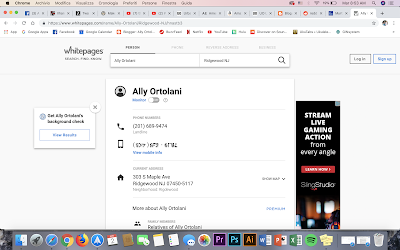How much personal information do you actually have on the internet?
After all the scandals and controversy surrounding Facebook, one would think that people would take into consideration how much information the general public could access. With a quick google search, anyone could access your public information--or even information that one is not aware of. Information can include, but is not limited to: your first/last name, email, phone number, photos, etc.
This poses the question: how much information should we allow for general consumption?
Upon searching myself on Google, I immediately could access nearly all of my social media accounts. My Facebook, Twitter, Instagram, and multiple photographs from my adolescence. My likes and dislikes on Facebook, where I went to high school, or even where I currently attend college are all things others can read about me.
I am guilty of being nearly every social media platform; and to name a few: Facebook, Twitter, Instagram, Snapchat, Tumblr, Pinterest, VSCO, Reddit, etc. Basically, you name a social media platform and I am most likely on it. While I am not active user on most platforms now (I probably use only Facebook, Snapchat and Instagram), I would attest that I have a significant online footprint.
Perhaps I am naïve with the seriousness of privacy concerns. Should I really be allowing website to have access to my phone number or address? To be completely honest, I forget which websites I granted access to my personal phone number, address, etc.
In hindsight, that was a bad play on my part.
While I am aware of the content that is found online, the content posted is there forever. Nothing can be deleted. Period.
And trust me, my parents have CONSISTENTLY ingrained this into my head.
Numerous people across all ages face countless privacy risks when allowing social media platforms or other websites to access--what should be--private information.
Those who share an overabundance of information on the internet also face a risk with potential job employers. According to Business News Daily, 70 percent of employers use social media to screen candidates during the hiring process--and 43 percent of employers use social media to check on current employers.
DeeAnn Sims, founder of SPBX claims, "Because we tend to view our social media accounts as being 'personal,' there's a good chance that by viewing someone's profile, you'll get a glimpse into their personality beyond the resume."
Others most become cognizant to the information he or she posts online. What could people think of them? What could others think of me--especially with my outspoken political views? Should I be more silent about issues like such?
Social media, as well as the internet, could be both beneficial or negative. Granted, it promotes a sense of connectivity amongst users, but could that sense of connectivity be considered a form of "pseudo connectivity?" Perhaps, yes.
Simply put, be aware of your online presence because you never know what could come back and haunt you.
This poses the question: how much information should we allow for general consumption?
 |
| Above is a google search of myself. |
Upon searching myself on Google, I immediately could access nearly all of my social media accounts. My Facebook, Twitter, Instagram, and multiple photographs from my adolescence. My likes and dislikes on Facebook, where I went to high school, or even where I currently attend college are all things others can read about me.
I am guilty of being nearly every social media platform; and to name a few: Facebook, Twitter, Instagram, Snapchat, Tumblr, Pinterest, VSCO, Reddit, etc. Basically, you name a social media platform and I am most likely on it. While I am not active user on most platforms now (I probably use only Facebook, Snapchat and Instagram), I would attest that I have a significant online footprint.
Perhaps I am naïve with the seriousness of privacy concerns. Should I really be allowing website to have access to my phone number or address? To be completely honest, I forget which websites I granted access to my personal phone number, address, etc.
In hindsight, that was a bad play on my part.
 |
| Above are photos one could access of me upon search my name. |
While I am aware of the content that is found online, the content posted is there forever. Nothing can be deleted. Period.
And trust me, my parents have CONSISTENTLY ingrained this into my head.
 |
| Whitepages is known for finding people's contact information or performing background check. The above photo is my profile (that I did not create myself). |
Numerous people across all ages face countless privacy risks when allowing social media platforms or other websites to access--what should be--private information.
Those who share an overabundance of information on the internet also face a risk with potential job employers. According to Business News Daily, 70 percent of employers use social media to screen candidates during the hiring process--and 43 percent of employers use social media to check on current employers.
DeeAnn Sims, founder of SPBX claims, "Because we tend to view our social media accounts as being 'personal,' there's a good chance that by viewing someone's profile, you'll get a glimpse into their personality beyond the resume."
Others most become cognizant to the information he or she posts online. What could people think of them? What could others think of me--especially with my outspoken political views? Should I be more silent about issues like such?
Social media, as well as the internet, could be both beneficial or negative. Granted, it promotes a sense of connectivity amongst users, but could that sense of connectivity be considered a form of "pseudo connectivity?" Perhaps, yes.
Simply put, be aware of your online presence because you never know what could come back and haunt you.
Comments
Post a Comment